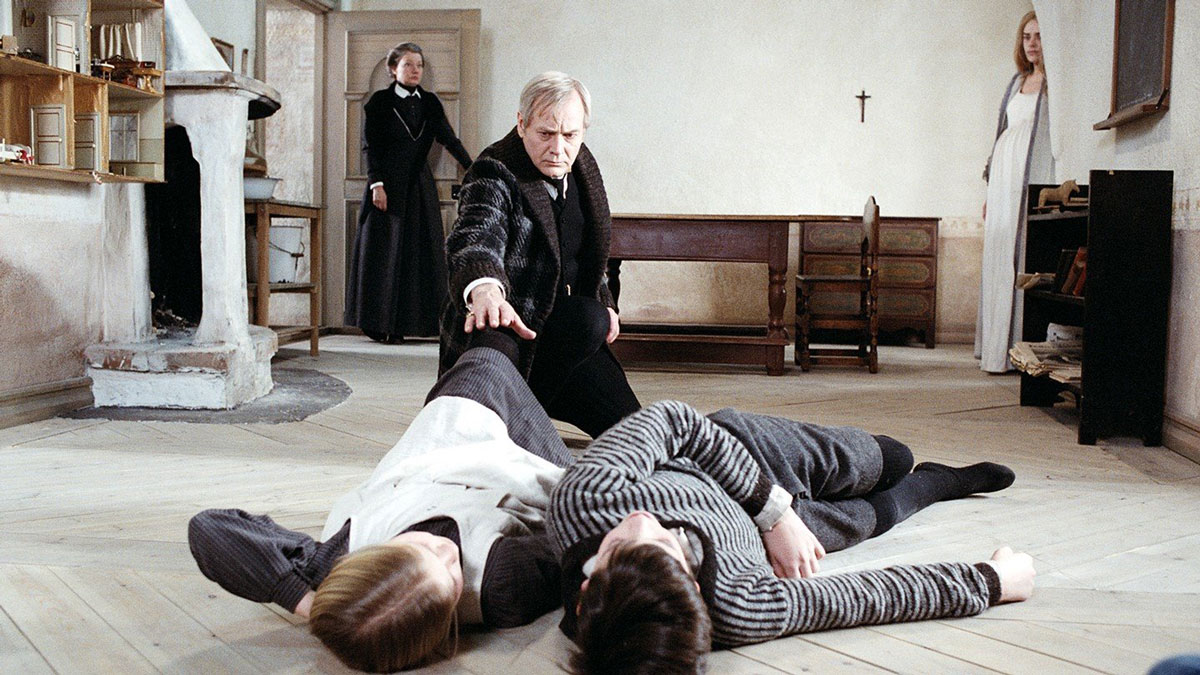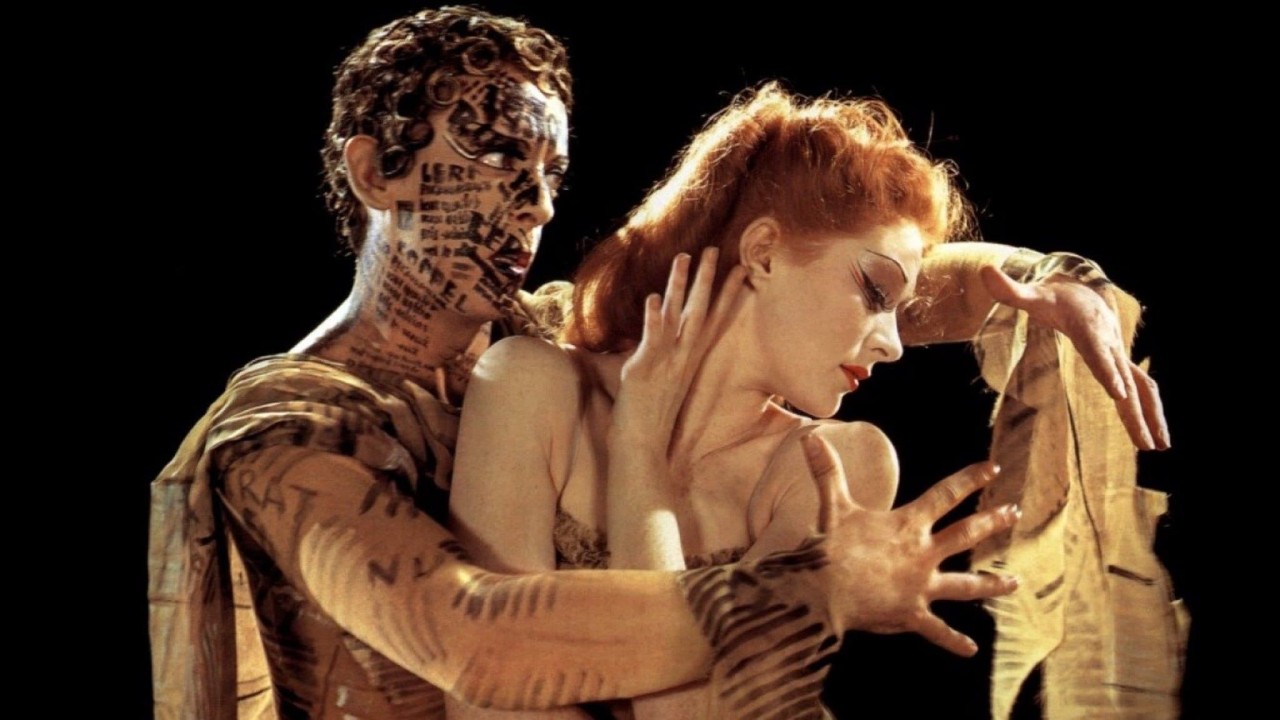by Barbara Quart and Leonard Quart
One doesn’t want to believe Bergman when he informs us that Fanny and Alexander is his last film—after all these years of emotionally and intellectually stirring work, steadily produced. We’ve spent a whole adult lifetime in his company—or struggling with friends who fiercely rejected him: those who don’t like films which so obsessively take dark journeys into the deepest part of the psyche and can be unrelenting in their anguish, or political friends who grumble about the privilege of the world he describes (in this film more than ever) and who scorn such “self-indulgent” “bourgeois” themes as anxiety over death and the passage of time, the lack of larger cosmic meaning, the failure of parents towards children, and the ravages of lovelessness. It’s hard to think of other directors who have elicited such extreme critical responses: from those who see him as a cinematic Dostoyevsky or Shakespeare (actually, he’s never seemed more Shakespearean than in this film, and Shakespeare was clearly on his mind as he made it) to those who dismiss him as too literary, too linked to high culture.
Our usual experience, however, has been to come away from each new Bergman film with the feeling of a rich gift given. There has been a harrowing of hell, but also a rehealing on a more profound level. Some of us date our adult love affair with film to the time we stumbled out of The Seventh Seal with a bewildered, stunned sense of something enormous altered in our world. Or we remember leaving Persona shaking, because of the simultaneously complex and primal truths about identity and relationships which the film powerfully conveyed. It’s difficult to summarize all the intertwinings of our lives with his work—and it’s equally painful to face the loss of Bergman from the screen.
If it’s hard to imagine ourselves doing without his films, it’s even more difficult to conceive of Bergman himself doing without them. One hopes he will relent and decide that he must start again, a small film for television, perhaps. But there is no denying the valedictory atmosphere of Fanny and Alexander—a lush, sprawling, glowing work, running over three hours (there is a five-hour Swedish television version), centered around the upper- middle-class Ekdahl family—the widowed matriarch, Helena (Gunn Wallgren), her three sons and their wives, and two of the grandchildren, Fanny and Alexander. Along with its references to Hamlet, there is something of The Tempest about the film: the magician Prospero coming before us one last time to announce that our revels now are ended, and to send his fairies away (or pack up his puppets). So the young boy Alexander’s actor/theater-manager father, Oscar (Allan Edwall), solemnly and lovingly looks one final time at his little theater, after twenty-two years with it, and in one of the film’s most resonant moments tells us, haltingly because he is so full of emotion, that the theater can serve as a little world which helps illuminate the great one, and can also at the least provide a moment’s escape from the outside world’s harshness. (So too Bergman places Gunnar Bjornstrand, one of his major actors over the years, among the acting company in this film, looking painfully old and frail, and has Gustav, another of the brothers, give him a fond kiss at the final family feast table, as he pays homage to artists.)
It’s clearly Bergman who is speaking through Oscar’s wan, exhausted, ineffectual persona—just as Oscar’s brothers carry other strains of the complex, divided Bergman self. Gustav Adolf (Jarl Kulle) is a good-natured, pleasure- loving restauranteur who lunges at all the young maidservants, and is indulged by wife and family. He is an innocent, somewhat foolish priapian figure, who is conscious of his aging body and his need to prove his sexual prowess. The third brother, Carl, a professor who rends himself both for being second-rate and for being mortal, is the self-tormented figure of the three—a drunk, an insomniac, a debtor.
As the three brothers represent a composite male protagonist, so the imaginative, sensitive ten-year-old Alexander (Bertil Guve), who has an extraordinary clear-eyed intelligent beauty, suggests the young Bergman, as he avidly plays with his magic lantern and slides, and his toy theater. (This despite Bergman’s denying the connection in interviews: “He’s a young nobleman. I was just a worm!”) It’s Alexander’s point of view which is central to the film, though at times the world is seen through an objective camera eye and at others from the perspective of Emilie, Alexander’s handsome, warm actress-mother (Ewa Froling). These different points of view create a sensuously textured world, inhabited by more joy, life energy, humor, and sense of community than exist in any other of Bergman’s recent films. But that is not to say that the film is a simple homage to a sweet harmonious existence. Evil exists here too, as does guilt, death anxiety, and a profound sense of failure. However, no single emotion, mood, or theme is preeminent in this film—by contrast Autumn Sonata or From the Life of the Marionettes were dark, single-minded, pared- down chamber works, ravaged by anguish and violence. Fanny and Alexander is bountiful, inclusive, extraordinarily festive, an unhurried summation of Bergman’s obsessions, images and themes over the last 40 years.
From its opening scenes it conveys a feeling of high spirits, of light and of celebration. At the beginning, all of the Ekdahl family meet to celebrate Christmas in the sumptuous, warm rooms of Alexander’s grandmother. The apartment is crammed with paintings, books and sculpture, candelabra, food and drink on bright red tablecloths—a world of wealth, comfort, culture, all ashimmer— with a radiant shadowless light permeating the entire scene. The camera tracks after the whole company—including servants—as they dance and gambol through the rooms. One strongly feels the presence of time through the sense of ceremonies and rituals performed annually over many years. Looking out of the windows jewelled with frost, we see through Alexander’s eyes a townscape filled with an almost magical sense of color and movement. The external world is no severe, solitary island this time, but a busy town of snow-covered gas-lit streets filled with children throwing snowballs, sleighs lit by torches, street musicians, and flower sellers. It’s a world of extended families, both of the blood kind and the professional kind (the theater), and for the first time in a Bergman film a town seems a vibrant, life-affirming community, not a barren, alienated one.
The sense of celebration is extended to pillow fights among the children (inevitably bringing Vigo’s Zero for Conduct to mind) and a comic bed-breaking sex sequence (shades of Smiles of a Summer Night) between a goatlike Gustav and the lame, winsome nursemaid Maj. But the life force inherent in the film is not always so boisterous and bouncy. There are quiet moments where the grandmother Helena, who on the surface seems like a traditional matriarch, recalls to her intimate friend, the Jewish antique dealer Isak (played with awkward and gentle dignity and wit by Bergman regular Erland Josephson) that “you were a sweet lover—like strawberries” (invoking memories of another Isak in Wild Strawberries). But for all her strength, Helena can also seem fragile and vulnerable, tearfully conscious of time passing and life passing, the clock ticking away through her scenes, as she nostalgically pores over old photographs. As usual in Bergman films, his characters are acutely conscious of death, but less as existential terror here, a clock without hands, than as mundane struggle with age and the body’s weakness: the sensualist Gustav feeling faint after sex; or Oscar, with a grieving sickly face, panting for breath. Yet there are still nightmare images—the tormented brother Carl, or the Bishop’s appalling aunt, horrified by the Void, the Darkness, and even Alexander asks his ghost father whether he’s seen God—thus bringing back, just for a moment, the Knight of The Seventh Seal.
Because Oscar’s death is absorbed into a social network, the identification with the Void is diminished. He is truly mourned by both theater colleagues and family—his wife hysterically pacing and crying out like a wounded animal in the night, and a fearful Alexander retreating into a foetal position as his father, seen in poignant close-up, dies. There is also a crane shot of an elegant, formal funeral procession held by the town in his memory. Oscar suffers briefly and dies, but his death is treated as neither tragic nor meaningless—he has left a legacy of affection and love.
A matter of greater grief, the fullest expression of evil in the film, is Alexander and Fanny’s experience with their stepfather after their mother Emilie remarries. The thin-lipped, tyrannically handsome Bishop Vergerus (Jan Malmsjo) is another one of Bergman’s repressive pillars of orthodoxy (a parallel character in The Magician even has the same name). The whole segment dealing with the children’s entry into the Bishop’s bare, stone palace, complete with barred windows, dark attics, and a turbulent river outside, seems like a Dickensian fairy tale about cast-out children.
In Bergman’s tale the two children are thrown into the absolute power of adults with cold, angry hearts—the Bishop (Bergman grants him an added dimension by making him pained about and conscious of his destructiveness), his neurasthenic sister, and his insidious mother. This malevolent household, its equally grotesque servants, plus flashing lightning and thunder, is Gothic bordering on comic—and the stylized treatment also helps to distance the overpowering sense of evil. And though the impassive Fanny (whose point of view is almost invisible in the film, but who seems a seedling for Bergman’s full-fleshed placid women comforters) joylessly submits to the palace’s severe regimen, Alexander sturdily and heroically rebels. He rejects the victim’s role, and demonstrates breathtakingly bold courage in defying the Bishop when he knows he will not only be punished, but subjected to unusual humiliation. Alexander even angrily repudiates God and rages against his father’s death (intoning “cock,” “piss,” “shit,” during the funeral procession). He’s a boy who can’t easily be broken, but like the young Bergman, with his strict Lutheran pastor father, he can be deeply scarred. The Bishop’s cruelty, which clothes itself in Christian love, is most loathesome with the man’s continual physical touching of the boy—gestures that mimic loving ones but are instead all coercive and punitive. And there’s an archetypal Bergman scene when, after Alexander has been horribly whipped by the Bishop, his mother returns home and desperately runs up to the attic, to embrace and comfort the anguished male child, curled on the floor, ancient carved figures of the crucified Christ in the background of the shot, like something washed up from deep in the waters of the unconscious of the race itself. One need only consider the pain of so many of the children in Bergman’s films, from the grown son in Wild Strawberries to the grown daughter in Autumn Sonata or Face To Face, to know that whatever it was that really happened to Ingmar Bergman himself as a young boy, it could not have been less cruel than Alexander’s pain if it left such lifelong savage scars.
In moving from the early celebratory scenes at the Eckdahl home, to the later world of the Bishop, Bergman signals the change of emotional climate by careful use of color. The warm reds, maroons, woods of the grandmother’s house—and then the green leafiness, white furniture and white clothing at her summer cottage—are strongly contrasted with the pale grey-blues, blacks, stone, and bare severity of the Bishop’s residence. The film also shows that in each of these worlds life contains hidden rooms, innumerable secret pockets, mysteries—perhaps a development from Bergman’s early religious concern. Isak’s nephew Aron quotes his uncle’s kabbalah-like notion that God speaks through all things and everywhere there are spirits—though to keep life intelligible we lock these off. All things are possible, miracles, wonders. But some of those locked doors are terrifying, and when opened reveal the mad, destructive forces locked away in each household. The Bishop has a monstrous alter-ego, a bearded Aunt Elsa, passive, shapeless, face covered with sores, a constant reminder of his deformed underside, by which he is destroyed. And in Isak’s mysterious antique shop—a labyrinth of nodding dolls, heaving puppets, strange masks, a breathing mummy, and even Alexander’s father’s mournful-looking ghost— another androgynous figure, Aron’s brother Ismael (played by a woman), is locked away behind bars, his face full of shocking delicate cruelty. This figure, Alexander’s alter ego, frighteningly merges with the boy in a shot reminiscent of Persona. Bergman again, as in the past, illuminates the anger and violence each person carries—as Alexander wills through his alter ego the death of the Bishop, after he has dismissed his guilty pitying other father as of no help to him. It’s a scene which resonates with the child’s fantasy of omnipotence, the ultimate Oedipal magic, with its accompanying devastating sense of guilt.
The film climaxes as it opens, with a communal celebration, a christening—the Bishop miraculously dead and Alexander’s mother returned home. Gustav makes a didactic but moving speech about living in the little world —as Oscar did earlier—but he means the universe of decency, kindness, and mundane amusements and subterfuges. It’s a conclusion which goes back to The Seventh Seal when the knight sits contentedly over a bowl of wild strawberries—yearning to turn away from his tormented quest for meaning, his struggles with God and Death, for the kind of happiness associated with family and children in Bergman films. But Bergman never allows for an unambiguous embrace of life—for even Gustav says that night is falling and that Evil is like a mad dog that has slipped its chain and now freely roams the world, affecting us all. To reinforce that point, with all that wellbeing pervading the final small world, with Alexander home safe—absently strolling down a corridor eating cookies, Bergman has him suddenly felled to the ground by a ferocious slap from the ghost of his Bishop stepfather. You know then that wherever Alexander’s life will go on to, and this is a child destined to be an Alexander the Great of some kind, the ghost hand from the far-away past will periodically reach out and smash him to the ground again. So indeed it has Bergman all his life.
Because of such moments this is like no beautifully colored and costumed epic one has ever seen. For no matter how warm, comfortable, and gregarious the world seems at the film’s conclusion, Bergman’s vision of life as a festive spectacle is always bound, even undermined, by his consciousness of human corruption and anguish.
If Fanny and Alexander is really Bergman’s last film, it’s a grand and fitting way to conclude a career. The film is not without flaws (though some may be a result of its having been cut for theatrical release from five to three hours). Characters like Carl and his wife are provided with an intense, moving scene and then disappear; Alexander’s mother seems emotionally overwhelmed by her husband’s death, but in another scene with the Bishop inexplicably speaks of never having been stirred or happy in her marriage to Oscar; and other characters including Fanny exist like mere shadows without genuine definition. And the film leaps from joy to horror and back again, sometimes cutting away too abruptly from a mood and leaving us with too many unanswered questions. But this is quibbling, for Bergman clearly wants to free himself from the limitation of a single mood or tone, for all the brilliant control and yet virtuoso variation he can bring to that—and he takes delight in moving from comedy to Gothic horror and on to psychological realism. The film sprawls—Bergman choosing to play all the notes in his rich repertoire, hence the echoes of so many earlier films. It’s fitting that Bergman opts in his last film for plenitude rather than control. And yet at the same time one feels that he has this vast material under tight control—fluidly and skillfully introducing a large cast of characters, crosscutting and interweaving their lives with great pointedness, building with care, using deep- focus shots often and well, and providing beautiful and precise visual detail.
Not only is the film artful, but in it, in a hundred ways, Bergman makes a fervent recommitment to art itself. The film opens with an exquisite image, richly colored and warmly candlelit, of Alexander moving figures within a cardboard theater proscenium. Art and life are inseparable: as the Christmas festivities draw to a close, the camera focuses on the family members as they take their farewells, as if through a proscenium arch. And at various times, characters, especially Helena, speak of their lives in terms of a series of roles. There are a number of play fragments within the film, Alexander narrates along with his magic lantern slides to a rapidly attentive audience of the other children, he is himself given to theatrical gestures, and at the heart of the struggle between him and his religious stepfather is the accusation that this story-telling boy makes up lies.
Above all, as the film begins with a theater, so it ends—not with family festivities, not even with Alexander’s fall—but with the two women, Helena and Emilie, the matriarch and the young mother, planning in the dark red rooms of Cries and Whispers how to keep the theater going. And the boy artist carries this commitment into a third generation of artistic continuity. In the film’s final image he lies with his head on his grandmother’s lap, as she reads from Strindberg’s Dream Play, nurtured not only by female strength and love, but by female artists. The words Helena reads are a total affirmation of the imagination, for weaving new patterns on the elusive and flimsy base of reality. Fanny and Alexander may be Bergman’s farewell to film, but it is neither a work of pure nostalgia nor of self-pity and lamentation. It is a loving testament to and celebration of the continuity, infinite possibility, and power of art and the imagination.
Film Quarterly, Vol. 37, No. 1. (Autumn, 1983), pp. 22-27.





